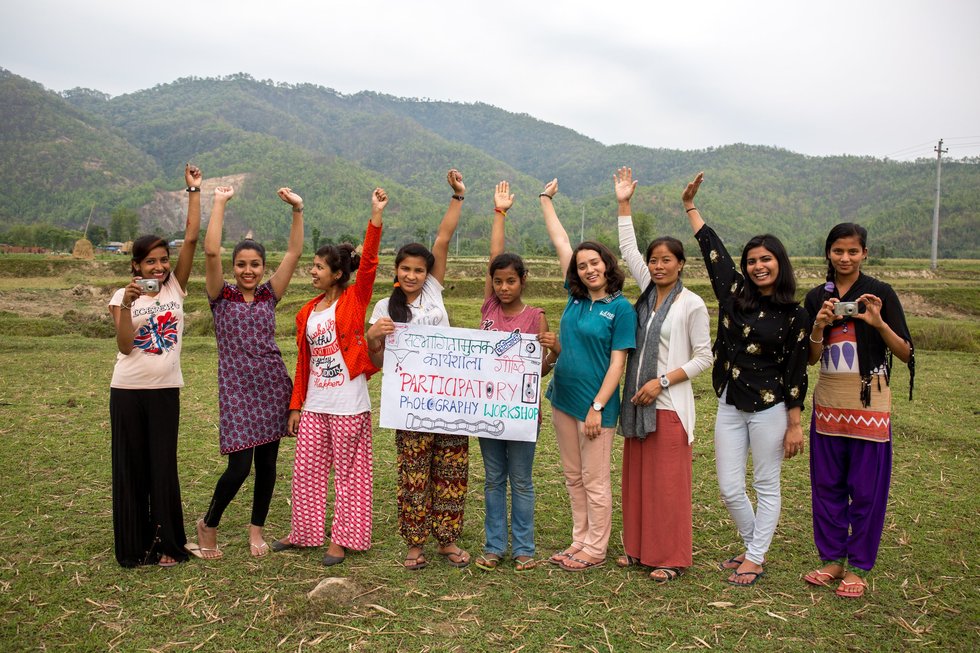
Participations Photography Workshop
Neha Basnet, Research and Outreach Officer, GUTHI : Year ago, I was one among many other silent observers applauding for the brave young hearts, who were taking initiative to stress on the stigmas around them related to the menstruation. They had a very simple yet powerful weapon for this; a camera. Every revolution beings with the understanding of the situation and the absurdity on it that restricts people to enjoy their human rights. For a society, shrouded with blind religious practices and values, it was a daunting task for them to highlight the ill practices embedded there since; they were also challenging the faith and values of their family and society.
Camera; a very simple tool was a triggering factor for them. Undergoing through the basic photography skills, these girls took a lead to capture the things they were not allowed to touch during the menstruation. Besides taking pictures they also experimented whether the sayings are actually based on the facts or are mere taboos. During this course of exploration, they were also empowered with logical thinking and decision making. The photo story and its documentation was such a powerful visual tool that left the family and the society wondering if they need to rethink on it. After a year of this intervention, I was fortunate enough to be able to participate in the process of documenting the impact of the previous activity. During this course, as a participant I learned about the different process to gather the stories that are relevant to the context and how to verbalize it through proper use of captions. As a development practitioner, I have found that my effort to address the situation has been inclined to demand driven basis, where as through this participatory photography it was revelation for me that, rather than exploring different options for an issues its better to go through the human dimension. Sometimes the problem itself is not problem; rather ignorance about problem is the actual problem. For those people, who have been practicing taboos as a norms since the time earlier, it’s very challenging to bring them into realization that there is some malfunction in the way we practice our culture and this thing cannot be achieved until and unless they themselves comprehend it. So, listening them, helping them to understand what is right and what is wrong is the first step towards empowerment and the change. With the better understanding, comes the decision making skill, which changes the practices and perception towards the issues.
Through the first phase of participatory photography approach young girls were able to point out the issues and the negative consequences it had in their health, education and psychology. During the process of clicking those pictures and exhibiting them among the community and family members, there was a triggering at one level; the participants began reasoning, questioning and then experimenting. Some of the taboos exhibited through the photos included water sources where as a menstruating girls they were not allowed to touch it, others included pictures of flowers, fruits, male members of family whom they were not allowed to touch. Similarly, there was a participant who had clicked picture of separate utensils since she was not allowed to dine together with her family members in a regular plate during her period days.
With this there came another echelon, as the participants started to bargain for a change with an evidence that convinced some of their family members and friends but most important of all it assured them that there is no wrong doing in menstruating and they should not be restricted to enjoy freedom, good health and education. With this belief the changes these girls have experienced is very stirring. Now the girl feels healthier, attends their regular class, takes care of their personal hygiene, enjoy nutritious diet, no more segregation and humiliation. These changes have boost their self confidence and multiplied the opportunities for good health, higher education, employment and dignified life.
Those girls facing seclusion and humiliation during their menstruating days now are getting support from their family; they can continue their regular class, eat nutritious diet and talk freely about what they feel. Even the infrastructure of school has been reconstructed gender friendly with provision of proper door, water and incineration for managing their period. Rabina Budathoki, one of the participants who aim to be police officer said that, “Previously, I was provided separate plate and bowls during 4 days of my period and I used to feel like outsider, but nowadays I can enjoy my meal with my family members.” Another participant Manisha Karki said that, “I was not allowed to eat papaya and touch flowers and vegetables during my period days as there was belief that if menstruating girl touches plants then they will die. After the workshop, I tried touching everything’s and nothing actually happened so, I have come to know that these sayings are myths only and menstruation is normal thing.”
It took one year for these girls to take a step to change within and surroundings; however when it comes to the religious structure and faith of people, change cannot be achieved overnight. Along with the faith in some religious practices there is also fear deeply rooted in mind and heart of people so, when it’s about experimenting these belief people don’t want to be part of it, reasoning for the possible harm in family. Safe menstruation and the awareness on it is the only way to ensure healthy and dignified life for women and girls. In this regard, even though the change comes slow, triggering is required for everyone at every level.
Photo Credit: WaterAid